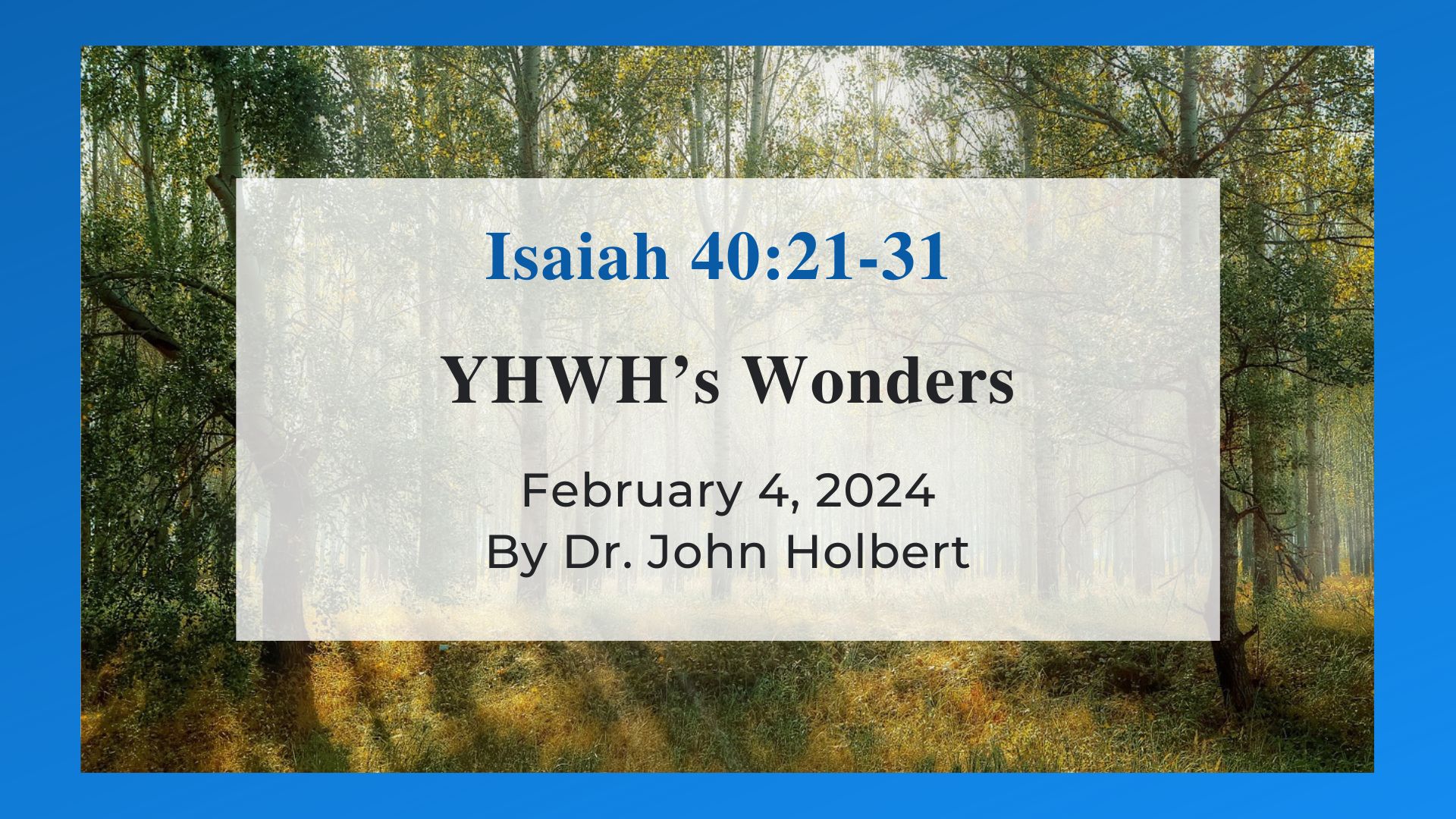YHWH’s Wonders - Reflections on Isaiah 40:21-31
by Dr. John Holbert on Tuesday, January 30, 2024

YHWH’s Wonders
Isaiah 40:21-31
The Peripatetic Hebrew Bible Preacher
Truly, this text for today is one of the Bible’s greatest poems. Its language and cadence are unforgettable, its theological thrust unmatched, its structure a superlative example of ancient Israelite verse. One could spend a scholarly lifetime examining and unpacking the riches that are to be found in these words. And because we find the text ensconced by the lectionary compilers in the season of Epiphany, that celebration of the appearance of Jesus of Nazareth on earth, its power takes on a new and different life, describing and exalting the God of all, and especially the God of Jesus.
The poem is marked by the arresting double use of the phrase “Have you not known? Have you not heard?” (Is.40:21, 28). The rhetorical questions, hurled at the exiles in Babylon, announce that the faith convictions of those captive Israelites are at a low ebb. Their belief in God, YHWH, appears to be collapsing under the historical weight of their long separation from the land of Judah. If we assume that 2-Isaiah is writing toward the end of that exile (ca.539BCE), an exile that has stretched into nearly 50 years, it is safe to imagine that very few if any of his captive hearers have ever seen Jerusalem, having only heard of its existence from their aging elders. It may well be true that those elders have attempted to instill hope for the future in their younger folk, a hope that includes a return to that fabled land of Judah and its near-mythic temple. Though some of those elders watched in horror as that temple was demolished and destroyed almost completely by the Babylonian armies, nevertheless its prowess and beauty as the dwelling of YHWH must have laced many a story of the glorious past. In contrast, the younger members of the exiles have only known Babylon and its wonders and glories, the power of Marduk, god of the city, and Etimenanki, the giant tower of the city, on the top of which the great Marduk lives. Indeed, “they may have heard” of YHWH and that God’s power, but they have seen little real evidence of it.
The poet nevertheless hymns the greatness of YHWH in potently memorable phrases. “YHWH sits above the circle of the earth, its inhabitants are like grasshoppers; YHWH stretches out the skies like a curtain, and spreads them like a tent to live in; YHWH brings princes to nothing, making the earth’s rulers trivial” (Is.40:22-23). YHWH is the creator of all, designer of all, and determiner of all things. Despite what the captives see with their own eyes, there is a force at work in the world that they have not seen, but that nevertheless continues that work “from the foundation of the earth.”
You may think Marduk is the world’s only power, but this poet is having none of that. “To whom will you compare me; who is my equal?” (Is.40:25). A glance at the skies and their starry wonders indicate that YHWH alone has made them, “bringing out their array, numbering their vastness, calling each by name” (Is.40:26). This claim is of course uttered in the midst of a Babylonian culture that prided itself on its astrological sophistication, leaving us with detailed charts of the stars and their movements. But this poet says all of that is a product of YHWH’s power, not Marduk’s.
But, the skeptical among the captives apparently are hardly convinced. “Why do you say, Jacob, and speak, Israel, ‘My way is hidden from YHWH and my right is disregarded by my God?’” (Is.40:27). In short, many believe that YHWH has both forgotten them in Babylon and has ceased caring for their plight at all. The poet again challenges them to both know and see that “YHWH is an eternal God, creator of the earth’s very ends,” and is also “never faint nor weary” (Is.40:29). And perhaps more importantly “gives power to the faint and strengthens the powerless” (Is.40:29). And then in a spectacular burst of poetic glory, the poet exclaims, “Those who wait for YHWH shall renew their strength; they shall mount up with wings like eagles, they shall run and not be weary, shall walk and not faint” ( Is.40:31). These lines have of course engendered that beloved hymn “Eagle’s Wings,” a hymn that has graced countless services of worship for the more than four decades since its composition.
But even after a too-brief look at this wonderful poem, is it enough merely to proclaim these statements about God, especially in a time and location where those claims do not appear to be even remotely plausible? Is that question not one that those of us who are 21st-century believers must still ask? The poem asked would-be believers in 6th century BCE Babylon whether or not they still ascribed to the conviction that YHWH remained the only God in the universe to whom they were called to give absolute allegiance. And the poem asks us 21st-century CE Christians the same thing. And how will we answer, living as we do in the midst of an increasingly non-believing world, a world that prides itself on its freedom from any creed, relying on human wisdom and strength only? What effects on human life does a reliance on this poem finally have? What do you say, preacher?
